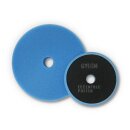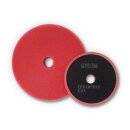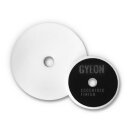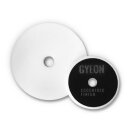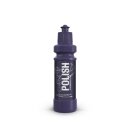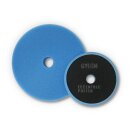he Q²M Polishing Pads perfectly complement the Gyeon range for paint preparation. They are made from high-quality premium foam, Made in Germany, and offer various subtle technical refinements to achieve maximum performance in machine polishing.
Of course, the pads have been developed to work ideally with Gyeon polishes and pastes, but they also perform reliably with the common polishes from other manufacturers in the market.
The eccentric pads are only 20 mm thick to accurately translate the eccentric movement in a 1:1 ratio. A centering hole and conically tapered edges are now standard, but what sets them apart is the shortened edge for increased pad lifespan.
The violet Heavy Cutting Pads are made from reticulated foam for enhanced heat exchange and are perfectly suited for processing coarse cutting compounds as well as fine polishes.
Question: What is special about the reticulated Gyeon polishing foam?
Answer: A reticulated pad is a specially manufactured polishing foam designed for use in paint care and vehicle detailing. The term "reticulated" refers to a process during foam production where the initially closed cells of the foam are opened and interconnected. The foam becomes permeable and can absorb materials such as polish, paste wax, etc.
During the manufacturing process, the foam is heated, causing its cells to break and fuse together. This creates open pores and a three-dimensional network of interconnected cells. This network significantly improves the structure of the foam and provides several crucial advantages for its use as a polishing pad.
Open pores allow for significantly increased and more efficient heat dissipation during the polishing process. There fore, detailers refer to them as "Thermopads." This is particularly important because polishing generates friction and heat, which could damage the paint if not properly dissipated.
Additional advantages of reticulation include:
- The network makes the foam more resistant and durable
- It prevents the foam from flattening or collapsing quickly
- Ensures even distribution of the polishing agent on the surface for a more effective polishing result
- Allows for cleaner work by reducing dust formation through improved heat dissipation
- Color: violet
- Material thickness: 20 mm
There are no reviews yet.
Write the first review for this item and help others make a purchase decision!
